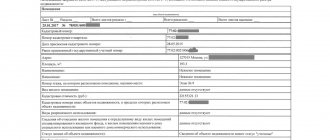Features of insurance
This agreement acquires legal force only after registration with Rosreestr, starting from the date of its registration until the transfer of the premises to the owner.
When drawing up an agreement with the first client, the developer must have insurance registered with an insurance organization and provide it for review by the future shareholder. In addition, after concluding the contract, the developer is obliged to familiarize all construction participants with the terms of the insurance contract.
If an insured event occurs, the shareholder has the right to demand compensation for material damage within two years after the transfer of ownership of the housing to him.
The liability insurance contract has a number of significant features. For example, the minimum insurance amount must exceed the contract price. It is calculated taking into account the cost of the object in the region where the object is to be built. Such insurance does not provide for a deductible, which can be used to determine the financial part of losses that are not subject to compensation.
If there is an early suspension of the contract or its termination, this does not relieve the developer company from fulfilling its obligations in the event of an insured event.
What features does it have?
In 2014, Federal Law No. 214 introduced amendments that made developer liability insurance mandatory. Developers insure this type of liability independently.
They can choose the following warranty protection method:
- insurance with the participation of a mutual insurance company, which operates on the basis of a license and is not much different from most insurance companies;
- insurance protection in which a banking institution acts as a guarantor;
- insurance with the participation of a company operating under a license.
Joining a compulsory insurance company is not a simple and financially secure process.
Everyone here is jointly and severally liable in the event of the bankruptcy of one of the members and must pay membership fees. There are also a number of other risks.
Insurance with the participation of a bank as a guarantor is unprofitable in the first place due to the procedure. It takes a long time to collect documents, and registration is not quick.
A deposit of 30% of the market value of the property must be paid, which will be a guarantee for the financial institution.
The amount of funds is limited, and the rate starts at 1% per annum of the guarantee amount. The legislation also sets restrictions for the bank that takes the developer as bail.
A financial institution must have been operating for at least 5 years, have an authorized capital of 200 million rubles and own property in the amount of 1 billion rubles .
Very few banks in the Russian Federation meet these requirements. All of them are closed and conservative. As a rule, it is much more profitable for a developer to get a loan from a bank than to issue a guarantee.
Banks themselves do not make sureties a profitable marketable product for developers. When an insured event occurs, they risk a lot and have many problems regarding debt collection.
The most profitable method of insurance can be considered drawing up an agreement with an insurance company. Thanks to the existing great competition between insurers, many programs look like truly profitable offers for the policyholder.
Firstly, insurance companies offer reasonable rates and prices. Secondly, when concluding an agreement with such an insurer, there is no need to look for money for collateral.
The insurance rate remains unchanged throughout the entire period of warranty protection, regardless of changes in the essential terms of the contract.
Under an insurance contract, services are paid upon completion of work. Another great advantage of insurance with the participation of insurance companies is the speed and convenience of drawing up a guarantee agreement.
The policyholder can predict risks and costs and reduce their level through long-term cooperation with the insurance company.
Regarding the parties to the agreement, we can say that the insured is always the developer. The insurer is selected depending on the method of insurance. The best option would be a contract concluded with an insurance company.
An insurance agreement regarding the developer's liability is beneficial for shareholders. They act as beneficiaries as a result of the occurrence of an insured event.
But the policyholder himself also has benefits from taking out insurance. The developer's liability insurance agreement allows you to continue activities in the field of shared construction and be competitive in the market.
The developer chooses the method of insurance coverage independently for each residential premises.
Terms and rules
Dear readers!
Our articles talk about typical ways to resolve legal issues, but each case is unique. If you want to find out how to solve your particular problem, please contact the online consultant form
It's fast and free!
Or call us by phone (24/7):
If you want to find out how to solve your particular problem, call us by phone. It's fast and free!
+7 (495) 980-97-90(ext.589) Moscow,
Moscow region
+8 (812) 449-45-96(ext.928) St. Petersburg,
Leningrad region
+8 (800) 700-99-56 (ext. 590) Regions
(free call for all regions of Russia)
According to the law, until 2021, the equity capital of the development company had to be at least 5% of the cost of the areas (residential, non-residential) of the constructed facility. If this norm was not observed, then the developer had to have a guarantor. Moreover, the minimum amount of their capital in total should have been at least 1 billion rubles. This provision created some difficulties for companies without such capital and for developers.
Starting from April 2021, the Ministry of Construction and Housing and Communal Services announced new standards for the authorized capital of the developer. Now they directly depend on the total area of the building being constructed.
The developer must not have previously been involved in litigation related to bankruptcy or liquidation, and must not have other problems with the law. Also, the contractor must not have any debt for the previous year. As for management, this clause has also undergone changes; now the chief accountant and manager must not have a criminal record. If at least one of the listed violations is present, this deprives the contractor of the right to use the shareholders’ funds.
Since 2021, all developers are required to create a website to post documents and information specified by law. The list of documents required for publication includes: permits for land, permits for the development of a certain site, the text of the agreement on shared construction, a package of design documentation, etc.
The project declaration is required to indicate a wide list of technical characteristics of the facility under construction, contacts for feedback, as well as complete information about the developer company. This declaration will be accessible because it must be filled out electronically on the website.
The insurance agreement is concluded by the developer and the insurance company. If the obligations are not fulfilled or the house is not delivered within the period specified in the contract, then all shareholders will receive compensation. The amount of accruals is determined during the process of concluding an insurance policy; in support of it, the relevant information is entered into the section of the document.
Liability insurance carries certain losses for the developer, so he will have to compensate: damage for violation of safety standards during construction work, late delivery of the project, etc.; services of legal companies or legal costs if shareholders have to defend their rights.
Rates
| Rates | Average | For large developers |
| Current rates in 2015. As a result of large-scale and long-term cooperation, tariffs can fall by 10-30% | 0,5-0,8% | 0,35-0,4% |
The rules of each insurance company determine the base rate, as well as decreasing and increasing coefficients. The coefficients depend on the degree of risk and may change during the term of the contract if the risks increase or decrease.
The insurance premium is determined based on existing rates and the duration of the contract. The latter is equal to the construction period.
Tariff rates are calculated as a percentage per annum, because there is a risk of complete non-fulfillment of obligations by the insurer.
Insurance companies always offer policies where rates are related to the duration of the contract. That is why it is possible to determine whether the insurer is a fraudster.
No insurance company with serious intentions today will insure a developer without linking tariffs to the term of the agreement.
You can check the validity of your insurance with the main regulatory body - Rosreestr. The insurer, within the framework of its obligations, will be liable throughout the entire term of the contract and even after 2 years after its completion.
Developer liability insurance is no longer necessary today. This is a prerequisite for every developer who wants to be competitive in the market for the services he offers.
The cost of cargo carrier liability insurance is discussed in the article: cargo carrier liability insurance. Read what the third party liability insurance contract says here.
This article explains what roadside assistance is.
What documents are needed?
To draw up an insurance contract and evaluate the tariff, you must submit a number of documents:
- Agreement/project of DDU (equity participation).
- Statement.
- Title documentation for land.
- Permission to carry out construction of a facility on a specific site.
- Urban planning plan of the land plot.
- Accounting statements for three years (form 1 and form 2).
- Project declaration (including passports of the company director and chief accountant, TIN, charter, OGRN of the organization).
The insurance company has the right to request additional data, for example, loan agreements, lending agreements, general contracting agreements, etc.
Who concludes the insurance contract
DDU insurance against unfinished construction is a mandatory condition, without which the share participation agreement cannot be registered in the Unified State Register of Real Estate and, accordingly, will not gain legal force.
That is, where and how to insure a residential building against unfinished construction and other risks is a headache for the developer.
Important! A construction company does not have the right to cover its costs through additional contributions from investors. Demands for additional payment above the contract price are illegal.
Although DDU insurance against unfinished construction is carried out in favor of the shareholder, the latter is involved in the conclusion of the contract only as a third party and his signature on the document is not required.
The very existence of insurance and its conditions is important to the shareholder, which the developer must notify him about. Insurance legal relations must arise between the developer and the insurer before the conclusion of the DDU, but they become valid only after the share participation agreement is registered.
What is an insured event?
The main risk of a developer company during shared construction is failure to fulfill obligations to construction participants.
Situations that relate to insured events:
- Failure to obtain an apartment.
- Refusal of the developer to return money invested in construction.
- Interruption (termination) of construction work.
- Developer bankruptcy.
The list of risks is not limited. For example, you can take out an insurance contract against natural disasters, fire, force majeure, etc. The law in this case limits the maximum amount of compensation.
Are there insurance supervisory authorities?
The Central Bank is authorized to monitor compliance with legal canons in cases of mutual insurance. Regional authorities monitor compliance with the conditions for participation of construction enterprises in a mutual insurance society. In the latter case, when the developer uses insurance to secure his obligations, he is obliged to notify shareholders about this very company.
Attention! An insurance company is obliged to conclude an agreement with another insurer or a guarantee with a bank within 15 days if its license is revoked, or participate in a mutual insurance company.
It often happens that shareholders attempt to solve a specific problem without having the necessary knowledge or skills to do so. And then the problem is solved either at great expense or not solved at all. A belated contact with a lawyer, even a highly qualified one, does not always save the situation.
If you want to have guarantees that the shared construction project will be protected from possible risks, contact a legal specialist at the stage of concluding the DDU.
Author: Bogdanova Irina Mikhailovna.
Lawyer for shared construction matters. Leading lawyer of the consumer rights protection society “Legal Supervision” on real estate and shared-equity construction issues. A lawyer with more than 15 years of experience, most of which involved resolving complex issues with real estate, as well as problematic developers. Provides legal support both in court and pre-trial on issues of equity participation. Thanks to his work, several thousand legal conflicts were resolved, many of which were resolved without resorting to litigation.
Payments: when they are paid, in what amount and what is needed for this
Payment of compensation from the Fund occurs on the basis of Federal Law No. 218, Article 13 in the prescribed manner (Government Decree No. 1233).
A meeting of residents is held only after the developer company is declared bankrupt. In order to return the funds paid, shareholders are required to make a decision to receive compensation and send the corresponding document to the Fund.
Within two weeks from the date shareholders make this decision, the Fund must publish on its website information about applications from shareholders demanding payment of funds for shared construction, in particular, about the procedure for processing and accepting such applications.
The shareholder must attach to the application a copy of an identification document and an extract from the register of creditors.
Applications are accepted until the end date for managing the developer’s affairs or later than this date (only if the deadline is missed for valid reasons).
Payment of funds is carried out to the details specified in the application within 10 days from the submission of the necessary documents by the share construction participant.
Payment of funds on the basis of an agreement with the insurer is made within a period not exceeding one month from the moment the insurer receives documents from the shareholder. He must contact the insurer before the date of completion of receivership.
When purchasing a home, an investor should take into account that only 120 square meters are insured by the state. m of premises, based on the average market price for an apartment.
A shareholder, when purchasing luxury real estate or a penthouse, has the right to ask the developer to provide documentation on voluntary insurance of the object under construction. He can also apply for compensation if the company is declared bankrupt (based on a court decision).
The minimum amount of compensation for this type of insurance is established based on the cost of the contract. The insurance company provides payments only within the specified amount. The amount of compensation should not be less than the amount that directly depends on the area of the premises (total) transferred to the shareholder and the cost of 1 m2 of living space in a given region.
Insurance against unfinished construction
Liabilities, payments and upcoming changes.
When investing money in our future apartment, we expect to receive it and receive it within the promised time frame. But in practice this does not always happen. Statistics on defrauded shareholders scares people away from participating in shared-equity construction: different sources give different figures - from more than 40,000 to more than 100,000 people; but in any case, the count goes into tens of thousands.
What to do to avoid being one of them, and what to do if your developer disappears/goes bankrupt/delays construction? First of all, familiarize yourself with Federal Law No. 214 “On participation in shared construction of apartment buildings and other real estate and on amendments to certain legislative acts of the Russian Federation,” which was amended just a few days ago.
Who is insured?
The issue of insurance of civil liability of the developer for non-fulfillment or improper fulfillment of assumed obligations is covered by Article 15.2 of Federal Law No. 214. According to it, the developer provides insurance:
- at your own expense;
- before the state registration of the agreement with the first participant in shared construction is carried out (that is, if the developer is not insured, Rosreestr cannot register agreements for the new facility);
- in two ways - either by participating in a mutual insurance company for civil liability of developers, or by concluding a civil liability insurance contract for a developer with an insurance organization that has a license to provide voluntary property insurance.
If the developer uses insurance to secure his obligations, then he is obliged to notify shareholders of both the terms of insurance and the method of insurance (that is, the mutual insurance company in which he is a member or the insurance organization that insures him).
An updated list of insurers that meet all the requirements of Law No. 214 is available on the Bank of Russia website - you can check the developer’s data. If the license of an insurance organization is revoked, the developer must, within 15 days, either enter into an agreement with another insurer, or participate in a mutual insurance company, or enter into a surety agreement with a bank.
A bank guarantee is another way to ensure the fulfillment of the developer’s obligations, an alternative to the insurance described above. As stated in Article 15.1 of Law No. 214, the guarantor is liable to the participant in shared construction in the same amount as the developer, including penalties provided for by law and the contract (fines, penalties). As in the case of insurance, the developer must notify the shareholders about his guarantor and the conditions under which the bank has agreed to guarantee him. Likewise, if a bank’s license is revoked, the developer is obliged to find a new option for providing guarantees to its shareholders within 15 days.
However, bank guarantees are used quite rarely - this is not the most profitable option for both the bank and the developer.
What is insured
According to Law No. 214, “an insured event is the failure or improper fulfillment by the developer of obligations to transfer residential premises under the contract.” This implies a whole range of situations in which the shareholder is injured: for example, the developer cannot provide the apartment purchased from him due to termination of activity, bankruptcy, or for one reason or another postpones the deadline for putting the house into operation.
The insurance contract comes into force from the date of registration of the DDU (agreement for participation in shared construction) and is valid until the deadline for transferring housing to the shareholder specified in the DDU. An insured event that occurs within two years after the end of this period gives the right to receive compensation from the insurance company.
“Failure to fulfill or improper fulfillment of obligations by the developer” must be confirmed by one of two documents:
- a court decision on the recovery of funds for real estate that has entered into force;
- decision of the arbitration court on the bankruptcy of the debtor and on the opening of bankruptcy proceedings.
True, you can go to court to collect the deposit only six months after the agreed period for the transfer of housing or the termination/suspension of construction has passed.
Insurance payments
The minimum insurance amount that a shareholder who has not received an apartment can claim depends on the contract price, but it will not be lower than the cost of housing, which is calculated based on the average market price per square meter of living space in the region where the property is located.
If the developer violates the deadline for transferring the property, you can demand a penalty from him for each day of delay. To do this, you need to send a written claim to the construction company and, if it does not satisfy it, go to court demanding payment of penalties and moral damages. The amount of the total payment will be determined by the judge, depending on the specific situation.
Shareholders' insurance
The shareholder himself can insure his purchase during shared construction; another thing is that not all insurance companies offer this type of service. The problem is that the probability of an insured event occurring is quite high, and many companies have found such insurance unprofitable. In addition, not every company has the ability to conduct an accurate examination and fully assess the risks of construction that has not even begun.
The price of such insurance depends on various factors: the company itself, the value of the object, the term of the contract, expert assessment, and can be 1 percent or more of the purchase price. Depending on the services provided by the company, you can choose insurance against various types of risks - from flooding to bankruptcy of the developer.
It is worth noting that at the end of last year, among other things, it was proposed by law to oblige shareholders to insure their purchase. But it was decided to abandon this initiative. However, some other items introduced to the State Duma in December 2015 were adopted this spring session - and Law No. 214 received several changes on July 3 of this year.
Changes in law and compensation fund
In particular, the minimum authorized capital for developers has been determined depending on the area of the objects being built; obligations of developers to provide information about themselves and the objects under construction on their official website; The cases in which the developer is and is not responsible for defects in the construction project have been clarified.
In addition, several additional articles have appeared regarding the surety agreement and the placement of funds in escrow accounts. The introduction of escrow accounts (special savings accounts) is precisely designed to further protect shareholders from the problems of developers.
According to this innovation, participants in shared construction transfer funds for the purchased apartment not directly to the developer, but to the account of a certain bank that has the right to carry out this activity and which lends to the developer. In the event of liquidation or bankruptcy of the construction organization, as well as the developer extending the transfer period for more than two months or a significant violation of the quality of the transferred object, the shareholder can withdraw the entire invested funds.
In addition, a new article of the law (Article 23.2. “Measures for additional protection of the rights, legitimate interests and property of participants in shared construction”) suggests the possibility of creating a special compensation fund operating on the principle of the Deposit Insurance Agency. This assumes that if an insured event occurs due to failure to fulfill the customer’s obligations, the shareholder will receive the invested money in the same way as he would receive it when the bank in which he had an account was closed.
The fund's funds must be generated through mandatory contributions from developers (but not more than 1% of the planned cost of construction of the property). True, since the article of the law only provides for the possibility of such a fund, it is not yet known whether it will actually be created and, if so, what the principles of its work will be.
Another change related to shared-equity construction (albeit already in the Criminal Code) affected liability for illegal raising of funds by developers - now this is not a fine, but compulsory work or even imprisonment for up to five years. Only full compensation for losses to the victims can save you from prison and criminal liability.
Time will tell how all this will affect the problems of both shareholders and developers. However, the situation required some changes - and they appeared.
Insurance companies that have the right to insure developers
Developer insurance is a rather unprofitable service. That is why most insurance organizations prefer not to operate in this segment of insurance services. In 2021, the Central Bank of the Russian Federation named 10 insurance institutions that have the right to enter into agreements on civil liability of development companies.
| № | Insurance Company | License for insurance activities | Insurer's TIN |
| 1 | Insurance Joint Stock Company "VSK" | SI No. 0621 | 7710026574 |
| 2 | Joint Stock Company "Insurance | SI No. 0915 | 7704041020 |
| 3 | Insurance public joint stock company "Ingosstrakh" | SI No. 0928 | 7705042179 |
| 4 | Open Joint Stock Company "AlfaStrakhovanie" | SI No. 2239 | 7713056834 |
| 5 | Limited Liability Company "Absolut Insurance" | SI No. 2496 | 7728178835 |
| 6 | Closed Joint Stock Company "Insurance | SI No. 2947 | 3328409738 |
| 7 | Joint Stock Company "State Insurance | SI No. 3211 | 8601023568 |
| 8 | Limited Liability Company Insurance | SI No. 3398 | 7702263726 |
| 9 | Limited Liability Company "BIN Insurance" | SI No. 3487 | 7717115093 |
| 10 | Non-profit organization "Consumer Society for Mutual Insurance of Civil Liability of Developers" | SI No. 4314 | 7722401371 |
| Relevance of the table: spring 2021 |
You can view the current list of insurance institutions authorized to insure civil liability of developers on the Central Bank website.
In addition, there is an approved list of credit institutions (there are more than 200 of them) that have the right to be guarantors when drawing up an insurance contract.
When it comes to insurance, there is only one serious problem - the likelihood of bankruptcy of the insurance company. However, if an organization has been successfully operating for more than 5 years in the insurance market and has numerous positive reviews, it can without a doubt be considered as a reliable partner.
Which companies can I apply for?
Insurance for developers is incredibly unprofitable; many companies are in no hurry to focus on this area. However, the Central Bank of the Russian Federation has compiled a list of organizations that can provide liability insurance for developers. It included 27 insurance companies.
They are:
- BALT-Insurance;
- VSK;
- VTB;
- Climbing;
- GUTA;
- Diamond;
- SC Ekaterinburg;
- Investstrakh;
- Interpolist;
- ISK Euro-polis;
- Merchant;
- Lexgarant;
- Master guarantor;
- MESCO;
- MSC;
- NASCO Tatarstan;
- Bet;
- Help;
- Priority insurance;
- Prominstrakh;
- Respect policy;
- SBG;
- Insurance investment company;
- Construction Insurance Group;
- Universal Guarantor;
- Torch.
The list also includes more than 200 credit institutions that can act as guarantors for developers.
What affects the cost of insurance
The cost of an insurance contract is not a fixed value, since it depends on many factors.
The cost of insurance is affected by:
- The area/region where the facility is being built.
- Business history of the developer (financial situation, reputation).
- Legal history of the company (presence of litigation in the construction industry).
- Number and conditions of commissioned facilities.
These factors are the main ones and must be taken into account when determining the cost of insurance.
How can a shareholder defend his rights?
As noted above, in order to return the invested money, the shareholder needs to be included in the register of creditors. To do this, an application is drawn up demanding the transfer of ownership of the property or a refund of money. The application is accompanied by an agreement drawn up with the construction company, as well as documents confirming the transfer of funds.
The bankruptcy of a developer is not a reason to despair. If the house is almost completed or completely built, but the commissioning papers have not been completed, the likelihood of receiving an apartment under the DDU is very high. If the house is at the construction stage, it is important to correctly draw up an application and submit it to the judicial authority on time.
In a situation where the construction of the object was “frozen” at the initial stage, and the shareholder’s apartment does not yet exist, you can apply for the transfer of ownership rights. Such a decision will be made only if another developer undertakes to complete the building.
When protecting your rights, it is important to pay attention to how the DDU agreement with the construction company is drawn up. There are two options here:
- The investor has a purchase and sale agreement for the apartment.
- The shareholder has only a preliminary agreement at his disposal.
The latter option is characterized by a situation where the court decides to terminate the document and makes a decision on the payment of compensation. If the shareholder has issued a DDU for an unfinished property, the judicial authority may declare it invalid due to the lack of a registration number for the apartment. The equity holder will have to prove that the contract was executed, which subsequently allows him to receive not only real estate, but also a penalty for late delivery of the property.
When choosing between returning money for an apartment and obtaining ownership of an unfinished property, it is worth considering one feature. In the event of a corresponding court decision, a bankrupt company is forced to pay money to a large number of creditors - its own employees, utility organizations, the court, and so on. It is possible that the developer will not have any money left to pay off the debt to the shareholders.
If you fill out an application for recognition of ownership of housing and receive approval from a judicial authority, the apartment is removed from the bankruptcy estate. This means that it cannot be sold together with the property of a financially insolvent construction company.
As soon as a bankruptcy trustee is appointed, the assets of the bankrupt company are sold at auction, and the money received is given to the creditor, taking into account the order stated above.
When receiving a court decision recognizing the right to own an apartment in an unfinished building or a share in common property, you can go in two ways:
- Become part of a cooperative of shareholders.
- Sell your home on your own.
The shareholder must understand that in order to protect his rights, he must meet the deadlines specified by law. In particular, during the first 30 days, a register of creditors is monitored and formed with the assistance of the Arbitration Court. After the start of bankruptcy proceedings, you can fill out and submit an application requesting the transfer of money or obtaining the right to housing within 2 months.
If the investor does not submit an application on time, he retains the right to claim the allocated funds. The downside is that his claims will be the last to be satisfied. If there is no money left to pay, the shareholder is left without investments and real estate.
Actions of a shareholder in case of bankruptcy of a construction company
After receiving a notice from the bankruptcy trustee or a publication in the media, you must promptly apply for inclusion in the register of claims against the bankrupt.
Step-by-step instructions for the actions of the shareholder in the event of bankruptcy of the developer are as follows:
1. Preparation of an application and documents confirming the right to demand reimbursement of funds spent under the contract or the provision of housing.
The application is submitted to the bankruptcy trustee and the arbitration court hearing the bankruptcy case of the construction organization. It must indicate:
- applicant's details;
- name of the developer;
- information about the house construction contract;
- the information about the residential premises is additionally specified in accordance with the cost specified in the contract.
The original or certified copy of the agreement is submitted as confirmation. Payment documents confirming payment under the agreement are also attached to the application. The application itself makes reference to them, and also indicates the requirements for the return of funds or transfer of the apartment.
2. Transfer of the application and documents to the bankruptcy trustee within 3 months from the date of receipt of the notification. Reinstatement of the missed deadline is possible only by an arbitration court upon presentation of evidence of a valid reason (clauses 2, 4 of Article 201.4).
3. We are waiting for the requirements to be included in the register. The application is given 30 working days to consider, after which the bankruptcy trustee sends a response on the inclusion of requirements or refusal (clause 7 of Article 201.4).
4. If, after 4 months from the date of expiration of the deadline for the shareholders to present their claims, they did not decide to apply to the arbitration court with a request for the transfer of an apartment or house of unfinished construction, then the process of full settlement by the bankruptcy trustee begins (clause 1, clause 1, article 201.13) .
- contacting the insurer with a demand for payment of the insured amount. The settlement with the insurance company is regulated by Articles Parts 8, 17, 31, 35 of Art. 25 of the Law of July 29, 2017 N 218-FZ and Art. 15.6 of Law No. 214-FZ;
This is only possible if the developer's liability has been insured. If he is declared bankrupt, shareholders have the right to claim payment of the insured amount.
- when a bank guarantees under a DDU agreement, shareholders have the right to demand reimbursement of funds from the guarantor (Part 8, 17, Article 25 of Law No. 218-FZ);
- equity participation agreements registered after October 20, 2017 are subject to the legal requirement for the construction company to transfer mandatory contributions to a special compensation fund. Shareholders may claim compensation amounts from it (Article 23.2 of Law No. 214-FZ; clauses 1, 3, Part 1, Article 3, Part 1, Article 10 of Law No. 218-FZ), tax-free ( Clause 71, Article 217 of the Tax Code of the Russian Federation). If a participant in shared construction previously received insurance or guarantee payments, then in this case he will be denied a refund.
5. Submitting an application to the court for the purpose of recognizing ownership of an apartment in an apartment building.
If the developer is declared bankrupt, but before that he received permission to put the house into operation, and a transfer deed was signed between the participants of the DDU, shareholders have the right to recognize their ownership of the housing in court (clause 1, clause 1, article 201.8, clause 8 Article 201.11). To do this you need:
- submit a statement of claim for recognition of the construction participant’s ownership of residential premises - sample;
- pay the state fee - 6,000 rubles;
- send to the developer copies of the request and documents attached to it by letter with acknowledgment of delivery.
As a result, the arbitration court will issue a ruling recognizing the shareholder’s ownership of the apartment (clause 8 of Article 201.11 of Law No. 127-FZ).
What do shareholders have the right to demand?
Shareholders can demand:
- money (the amount of compensation consists of the amount under the contract and compensation for damage incurred)
or
- residential premises due to them.
Important:
- The decisive point in the issue of including shareholders in the register of creditors is compliance with the deadlines for submitting monetary claims, which are thirty days from the date of publication of the message about the beginning of the bankruptcy procedure, and two months from the date of publication of the message about declaring the debtor bankrupt. If the shareholder missed the deadlines established by law, the likelihood of satisfying his claims tends to zero.
- Another important point is the state registration of the agreement for participation in shared construction, without which inclusion of the shareholder’s requirements in the register is almost impossible.






